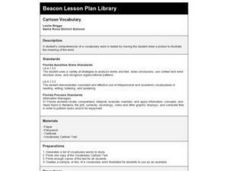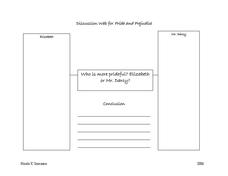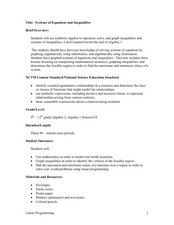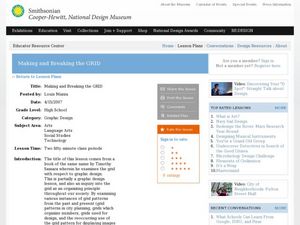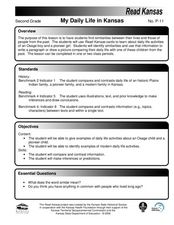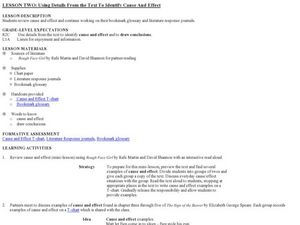College Board
Reading—Central Idea and Evidence
Young readers become experts at finding the central idea in informational text with an educational resource. The resource includes helpful tips to annotating close passages to succeed on the actual SAT exam, as well as strategies to make...
Roald Dahl
The Twits - The Twits Get the Shrinks
Turn readers into investigative journalists. The 11th and final lesson that accompanies The Twits by Roald Dahl asks the question "What happened to Mr. and Mrs. Twit?" The lesson uses mind maps and group discussion to help answer the...
K5 Learning
The Fishhawk
Read about why the osprey is also known as the fishhawk in a short reading passage that describes where they live, what they eat, and what they look like. After reading, individuals respond to four short answer questions based on what...
Curated OER
Cartoon Vocabulary
Third and fourth graders complete a vocabulary log which includes a definition, and a sentence that demonstrates the meaning of the word. Then make an illustration that represents the definition of the word. The trick is that they may...
Curated OER
Stories Aren't Always What They Seem; Or Are They?
Students draw conclusions about a story with examples to support their statements. In this reading comprehension activity, students look at a PowerPoint of a variety of passages from different books. They answer questions about the...
Curated OER
Making Inferences and Drawing Conclusions
Second graders make several inferences based on the reading of Shel Silverstein poems. They write their own poetry and complete an assessment in which they differentiate between sentences that are stated or inferred.
Curated OER
Pride and Prejudice: Discussion Web
Both Elizabeth and Mr. Darcy have proud moments, but who is more prideful? Explore Jane Austen's Pride and Prejudice with a discussion web that compares both characters in a brainstorming graphic organizer. Each side provides enough...
Annenberg Foundation
A Growing Global Power
How does a nation turn into a global superpower? The 16th installment of the 22-part series on American history investigates the rise of the United States to global importance in the late nineteenth and early twentieth centuries. Groups...
Museum of Tolerance
Oral History Activity
Oral history has brought a multitude of lessons, stories, and factoids to our current knowledge of the past. Let us continue to use oral history traditions through a activity that encourages pupils to discover and appreciate where they...
National Security Agency
Systems of Equations and Inequalities
High school classes can use manipulatives too! Offer hands-on, interactive lessons that venture away from the typical day in your algebra class. Young mathematicians will be involved in collaborative learning, visual representations, and...
Stanford University
Declaration of Independence
Scholars work in pairs to decide whether leaders wrote the Declaration of Independence for the rich and powerful or for every man. To draw their conclusion, pairs read excerpts from two historians and complete a graphic organizer citing...
Curated OER
Analyzing Literature via Literature Circles
Introduce literature circles with Roland Smith's novels. Your seventh graders will see the activity modeled as you read The Three Little Pigs together and apply the format to a Roland Smith novel of their choice. The lesson includes...
Curated OER
Child Labor in the Carolinas
Fifth graders explore child labor and how children were exploited and used in the work place. In this Industrial Revolution lesson, 5th graders research child labor by reading, looking at photographs and drawing conclusions then sharing...
Curated OER
Making and Breaking the Grid
Students examine the grid in terms of a method of organization in our society as well as graphic design. In this "Making and Breaking the Grid" instructional activity, students design solutions to common problems and draw conclusions...
Curated OER
My Daily Life in Kansas
Second graders use 'Read Kansas' cards to learn about the daily life activities of an Osage boy and a pioneer girl. In this similarities and differences lesson, 2nd graders write a paragraph and draw a picture comparing their daily life...
Curated OER
The Torah Tells...
Students extract and interpret information about the Torah text to draw conclusions about ancient Hebrew life. In this Torah lesson plan students research facts and complete worksheets about the Torah. Then as a class the students form a...
Curated OER
Land of Milk and Honey Relocated or Not (Lesson 3)
Fourth graders practice their research skills. For this North Carolina history lesson, 4th graders examine primary resources and draw conclusions regarding the birth of the city of New Bern, North Carolina.
Curated OER
Rivers that Flow from the Continental Divide: The Journey of Two Rivers
Students explore river routes. For this social studies lesson, students trace the route of a river from its source and discuss the Continental Divide. Students draw the route the river takes and name the states it flows through. Students...
Curated OER
Using Details From the Text To Identify Cause and Effect
Students word in groups to come up with cause and effect situations based on texts they are reading. In this cause and effect lesson plan, students record these in their literary response journals.
Curated OER
Solve a Mystery
Fourth graders use text clues to solve mysteries. In this text clue/mystery solving lesson, 4th graders access a teacher assigned web site, Cyberkids.com, where they solve a mystery. They read chapters of, Encyclopedia Brown, and work...
Curated OER
Esperanza Rising - Literature Circles and Review (Day 3)
Kids love working with their peers. Get your class into small literature circles and have them complete weekly assignments. Before beginning this week's activity, have each learner write a letter from Esperanza in California to Abuelita...
Curated OER
I Am Not a Crook
Students use video, Internet research and discussion to consider the presidency of Richard Nixon. They obtain information from multiple perspectives and form an opinion of how Richard Nixon should be remembered.
National Geographic
Expedition Clothing Then and Now
Introduce your class to the Everest expedition to reenact a 1924 climb by George Mallory and Andrew Irvine. Discuss and show pictures of the types of clothing worn at that time and compare it to today's state-of-the-art climbing gear....
Curated OER
Ornithology and Real World Science
Double click that mouse because you just found an amazing lesson! This cross-curricular Ornithology lesson incorporates literature, writing, reading informational text, data collection, scientific inquiry, Internet research, art, and...





